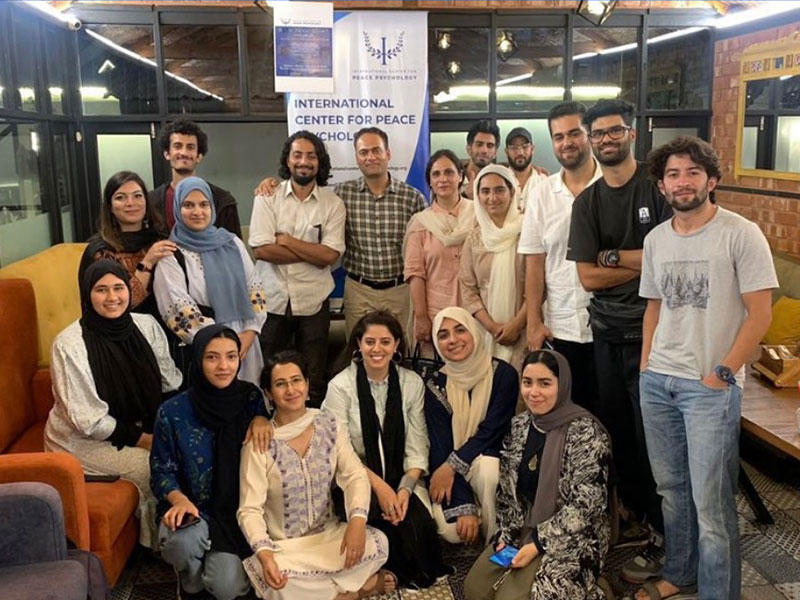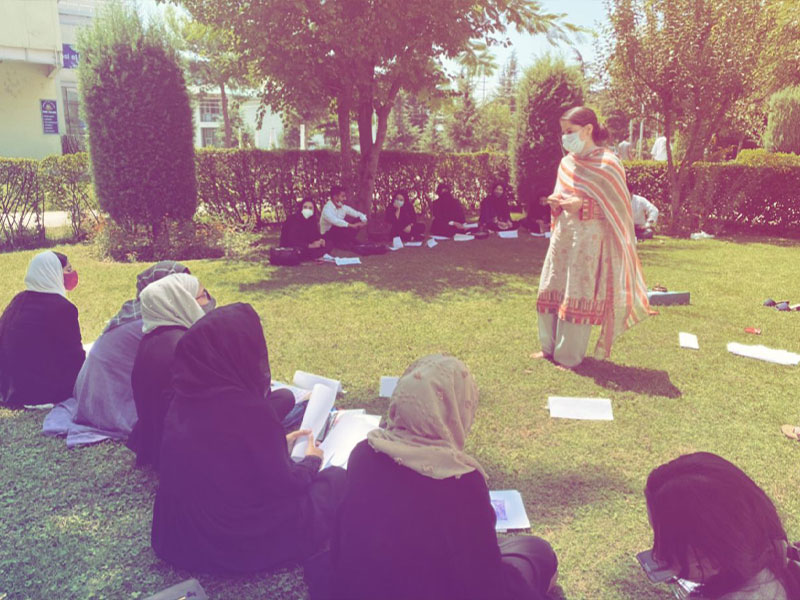Mental Health Is Political
Mental health, says Ufra Mir ’11, is political: “It exists in relation to the ecosystem, frameworks, and politics around you. If you’re existing in an ecosystem that is constantly toxic for you, full of fear and political anxieties, then mental health support isn’t sustainable in the long-term. Because the trauma is ongoing, and healing probably doesn’t happen in these contexts the way people in the West understand.”
Mir speaks with authority—not only did she grow up in a traumatized community in Kashmir, but she became that region’s first and only practitioner of peace psychology, a subfield of psychology that uses theory and practices to try to limit violence and conflict, and promote peace.
While that might sound straightforward, on the ground, Mir knows, peacebuilding is quite complicated.
Pioneering peace psychologist Ufra Mir ’11, who works widely with people in conflict zones, delivered a talk at TedxSurat in 2019.
Working against Normalized Violence
Mir grew up in Kashmir, a conflict region for more than seven decades. Curfews, shutdowns, middle-of-the-night searches, human rights violations, and daily killings were routine in her world. “From a very young age, I knew that something wasn’t right,” she says. “Around me, there was so much chaos, and slowly it was becoming normalized to us.”
Mir was the first Kashmiri to attend United World College Mumbai, where she encountered psychology courses and peace training for the first time. At Luther, she double majored in health and psychology while also training in peacebuilding. After graduating, she stayed with her Luther host family for a year while ramping up the nonprofit she’d started, Paigaam, an Urdu/Persian word that translates to “a message.” Paigaam has now evolved into the International Center for Peace Psychology (ICPP).

Ufra Mir '11 with colleagues from the International Center for Peace Psychology, an organization she founded
When Peace Is Controversial
For the past 12 years, Mir has worked as a peace psychologist in Kashmir, Myanmar, and other parts of South Asia and the Global South.
Mir’s work subjects her to high levels of surveillance and patriarchal norms. She has to constantly consider her plans. There’s a level of distrust in the region that makes even the word “peace” controversial.
“When people hear that you’re in peacebuilding, sometimes the community thinks you’re working with the government, and sometimes the government thinks you’re working with extremist groups. You have to constantly walk on eggshells,” she says. She has refused funding for her work because she worries about what funders would expect in return, as well as how funding might affect trust levels in the community.
“Even gathering is a privilege,” she says. “But I try to create a safe space for people to come together to take charge of their own narratives, because the system is always trying to create a counter-narrative for you. I try to create a pause or a bridge where people can stop and ask themselves: Is this normal?”
When Research Is a Privilege
Psychology is mostly a research-oriented field, and many Western researchers work in peaceful contexts. “From the get-go,” says Mir, “I wanted to keep my work more practice-oriented. This was also a way to protest against academia being colonized. When you live in a conflict zone, you don’t have the luxury or privilege of doing research. For that, you need resources, funding, and mental space to sit and reflect.”
She continues, “Things change in conflict zones so very often that you always have to be on your toes. There’s no concept of breaks. You’re always working—people can be calling you for support at 3 a.m. with panic attacks.”

Mir promotes healing and healthy expression through peace education, youth empowerment programs, mental health awareness, and peace psychology techniques. Here, she teaches at the University of Kashmir.
Culturally Inspired Psychology
Because many of the frameworks that psychologists use are Eurocentric and may not work well in all Global South contexts, Mir has tailored her practice to her community. “I started taking inspiration from my own culture, history, architecture, language, arts,” she says. “This is also, in a way, a protest against the [collective] memory and history that’s being changed. In order to save and preserve it, I started making use of these elements a lot more, as my focus is on decolonized peace psychology practice.”
One practice that illustrates this is the Zuun-é-Daeb initiative at ICPP, which takes its name from Kashmiri architecture. In old Kashmiri houses, people would gather and use this attic room to connect with one another. In Mir’s practice, this translates to a creative/reflective safe space—virtual or physical—where people can share, express, learn, listen, and find mutual support.

Mir works with a group of students at the Scholars' School on International Peace Day.
Connecting Reality with Policy
For the past few years, Mir has focused on connecting practitioners’ on-the-ground learning to policy spaces, including global forums that work directly and indirectly with the United Nations. “Otherwise,” she says, “you have people making policies who have no idea what’s happening on the ground.”
After many fellowships, for the next year, she plans to continue this work through a fully funded Rotary Peace Fellowship at the University of Bradford in the UK, home of the world’s largest peace studies department. But she’ll remain active with ICPP from afar.
“For me, peacebuilding is not just about teaching people how to be nonviolent. The people are not the problem—the systems are the problem,” she says. “The work I’m doing, in that way, redefines what peacebuilding is. It’s a process. It’s awareness. Moreover, much of peacebuilding, resilience, and nonviolence needs to be rethought through a liberation, justice, local resistance perspective.”
To learn more, visit internationalcenterforpeacepsychology.org.